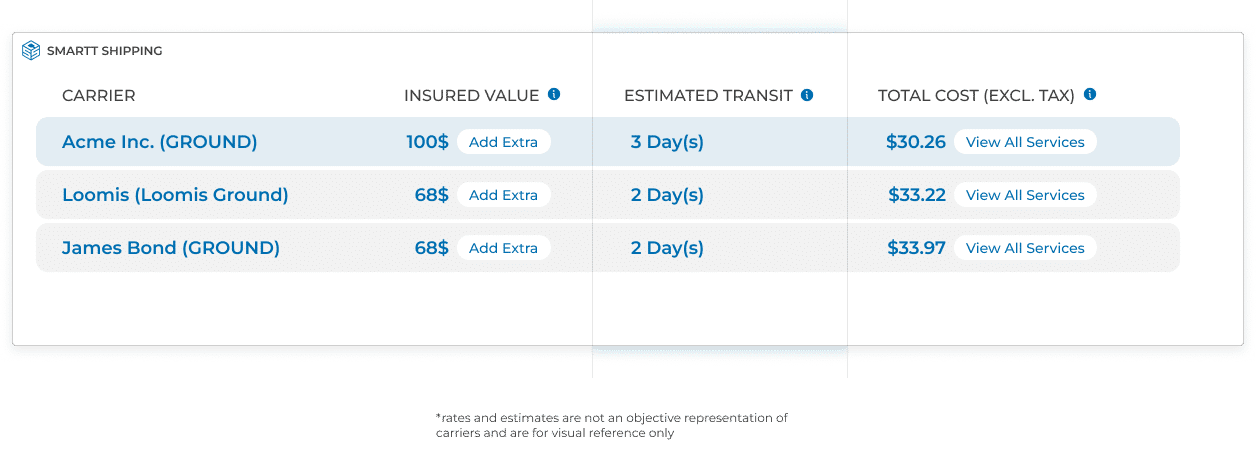Transit Times
At Complete Shipping Solutions, we understand the importance of timely deliveries for your shipments. Our innovative software, SMARTT Shipping, empowers our customers to make informed decisions by comparing transit times from multiple carriers.
What are Transit Times?
Transit times refer to the duration it takes for a shipment to travel from the point of origin to the final destination. It is the time elapsed between the pickup of the goods from the shipper’s location to the delivery of the goods at the recipient’s designated address.

Estimates, not guarantees.
It’s essential to note that transit times provided by SMARTT Shipping are estimates generated from each carrier, based from historical data, carrier performance, capacity, and other relevant factors. We strive to provide accurate estimates, but various factors beyond our control may impact the actual delivery schedule.
Does the transit time include weekends and holidays?
Transit times for shipping do not include weekends and holidays. When carriers provide estimated transit times, they refer specifically to business days, typically Monday to Friday. Weekends, which encompass Saturday and Sunday, are not considered in the calculation of transit times. Similarly, transit times do not account for public holidays observed in the shipment’s origin or destination countries.
If a package has an estimated transit time of 3 business days, it means the delivery is expected to occur within three consecutive working days, excluding weekends and any public holidays falling within that period.
What factors can cause delays during transit?
Several factors can cause delays during transit in the shipping and logistics industry. While some of these factors can be anticipated and managed, others may be unforeseen and require proactive measures to minimize their impact. Here are some common factors that can cause delays during transit and how they are managed:
- Adverse Weather Conditions: Severe weather events like storms, heavy snowfall, or floods can disrupt transportation networks, lead to road closures, and affect air and sea travel.
- Traffic Congestion: High traffic volumes, road construction, accidents, or other traffic-related issues can slow down the movement of goods on highways and roads.
- Customs Clearance: For international shipments, customs clearance procedures can cause delays, especially if there are documentation errors, inspections, or compliance issues. Timely and accurate preparation of customs documents is crucial, and working with experienced customs brokers can expedite the process.
- Labor Disputes: Labor strikes or disputes at ports, airports, or distribution centers can halt operations and result in shipment delays.
- Equipment Failure: Mechanical breakdowns or equipment failures in trucks, airplanes, or vessels can disrupt schedules.
- Incorrect or Insufficient Documentation: Inaccurate or incomplete shipping documents can lead to delays and cause shipments to be held for inspection or correction. Ensuring proper documentation is provided before shipment is crucial.
- Package Misrouting: Human errors in sorting or labelling can lead to packages being sent to the wrong destination, causing delays. Automated systems and meticulous quality control procedures can help prevent misrouting.
- Port Congestion: Heavy port congestion can result in delays in unloading and loading cargo, affecting the overall transit time. Monitoring port conditions and planning for peak seasons can mitigate the impact of congestion.
To manage delays during transit, we provide various strategies, including proactive monitoring of shipment progress, real-time tracking, clear communication with customers about potential delays, and close collaboration with supply chain partners to find solutions and alternatives when disruptions occur. Our goal is to always minimize the impact of delays and ensure the smooth flow of goods to their final destination.
How can I stay up to date on travel delays?
Stay informed and up-to-date on travel delays by regularly checking our SMARTT Shipping Notice Board.
This notice board provides real-time updates on any potential disruptions to your shipments, ensuring you are well informed at every step of the shipping process. Whether it’s adverse weather conditions, unexpected logistical issues, or any other factors affecting transit times, our SMARTT Shipping Notice Board will keep you informed, allowing you to plan ahead and make necessary adjustments to your schedule.
With this valuable tool at your fingertips, you can have peace of mind knowing that your shipments are being monitored and managed with utmost efficiency and transparency.

explore logistics with Our complete shipping solutions Blog





